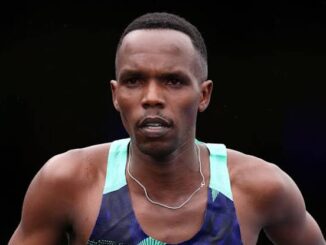
Just minutes ago, Janet Samoei, wife of star Kenyan runner Amos Kipruto, dropped a bombshell on social media, sending shockwaves through the running community. In a post that has since gone viral, she accused not only her husband’s coaching staff and sponsors, but also a cadre of elite athletes of attempting to coerce Kipruto into using banned performance‑enhancing substances, in order to surpass his rival, Kiplimo. According to Janet’s narrative, when Kiplimo refused—or rather, when Kipruto refused—he “could only finish second.”
Janet went further, naming five athletes (unnamed here as I did not find independent confirmation) who allegedly were part of the pressure apparatus pushing Kipruto to cheat. The accusation is that these runners leveraged their influence over coaches, sponsors, or intermediaries to push him into doping, but he resisted. The tone of Janet’s post is one of outrage, betrayal, and a desire to “expose the corrupt forces behind the scenes.”
Within moments, the running world responded. Many praised Janet’s courage in coming forward, calling her a “brave woman” for challenging what they see as a deeply entrenched culture of doping and shadow influence in elite athletics. Conversations exploded across social media: supporters calling for accountability, skeptics demanding proof, and others warning of the risks of libel and scandal.
Shortly after Janet’s post, the Athletics Integrity Unit (AIU) released a statement saying that it would investigate the allegations she raised, particularly those implicating Kipruto’s team and the named athletes. The AIU’s involvement is significant: it means the claims are being taken seriously enough to merit formal inquiry.
If verified, Janet’s claims would raise seismic questions about integrity, power and coercion in the sport. They suggest a system in which athletes aren’t merely tempted to dope for performance, but might be pressured by others — coaches, sponsors, or rival runners — to comply. The idea of athletes being manipulated by the “deep machinery” behind the scenes strips away some of the agency from the individual, and could complicate how we think about culpability, responsibility, and oversight.
But of course, there are major caveats and uncertainties:
- I have not located credible independent sources confirming Janet’s specific post or the names she named.
- Accusations of doping are gravely serious and legally fraught; they require rigorous, scientifically verified evidence (lab results, chain-of-custody records, corroborating testimony).
- The AIU itself has recently sanctioned Kipruto: in June 2024, he was banned for six years following findings of irregularities in his biological passport, with the tribunal concluding that blood manipulation was “highly likely.”
- Because of that ban, some of the context in which Janet is now making these claims may be colored by existing controversies, sanctions, appeals, or resentments.
At this moment, the stakes are high. If the AIU’s investigation substantiates Janet’s allegations, there could be additional sanctions, reputational ruin, and legal consequences for those implicated. If the claims are unsubstantiated, there’s risk of defamation, reputational damage, and backlash against Janet and Amos.
In sum: Janet Samoei’s explosive post, if authentic and supported by evidence, could expose a new dimension of doping in athletics — one involving coercion and manipulation by powerful actors behind the scenes. The AIU’s announcement to investigate means this is no longer just rumor; it’s entering the realm of formal scrutiny. The coming days will be crucial: who will produce credible documentary evidence? Will any of the named athletes or coaches respond? What will forensic anti‑doping science reveal.

Be the first to comment